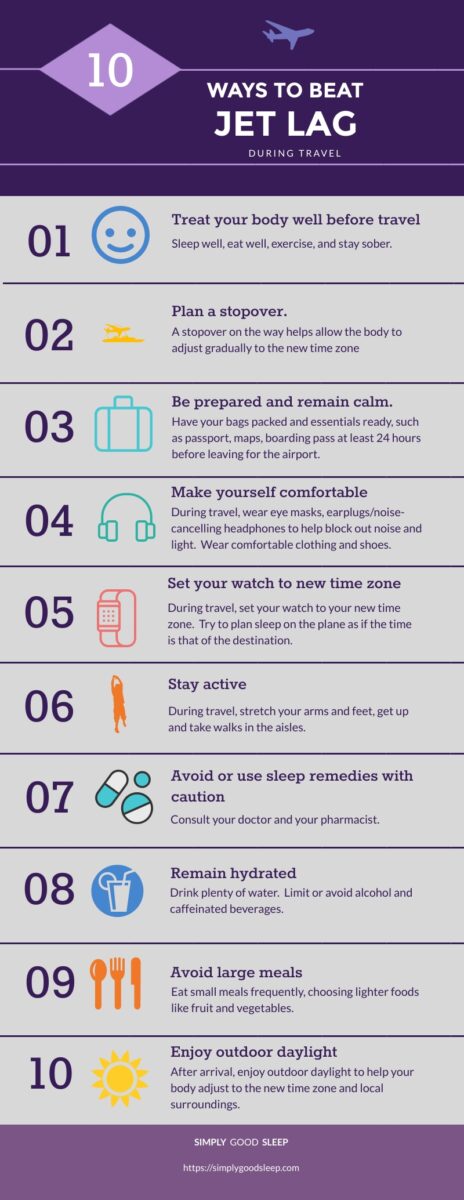
What is jet lag?
Jet lag is a transient sleep condition that can affect anyone who travels across multiple time zones.
 Your body has its own 24 hour internal clock, or circadian rhythm, that signals your body when to stay awake and when to sleep.
Your body has its own 24 hour internal clock, or circadian rhythm, that signals your body when to stay awake and when to sleep.
Crossing time zones disrupts your body’s internal clock.
Jet lag is the result of your body’s clock still being in sync to the time zone of the location you have left, and not in sync to the time zone of your new location. You are more likely to experience jet lag with increasing number of time zones crossed.
Symptoms of jet lag can vary. You may experience only one symptom or you may have many symptoms. Jet lag symptoms may include:
- Insomnia, difficulty falling asleep and staying asleep
- Fatigue and difficulty staying awake during the day
- Irritability
- Difficulty concentrating or functioning at your usual level
Jet lag can happen to anyone, regardless of age, fitness level, health, and whether or not you are a seasoned traveller.
Jet lag usually is worse when a person flies east rather than west.
Is jet lag dangerous?
Jet lag is temporary, but it can significantly reduce your vacation or business travel comfort. Most people get better 3 to 4 days after their flight.
Elderly travellers may take longer to recover from jet lag.
If you travel frequently and experience ongoing jet lag symptoms that significantly impacts your vacations or business trips, consult a health care professional
How can you deal with jet lag?
You may be able to be relatively jet-lag free throughout your leisure or business trip by using the following strategies:
Before Travel
- Be well rested before you start to travel. Eat right, keep getting a good night’s sleep, and keep exercising. Sleep deprivation will make jet lag worse.
- Stress can worsen jet lag. Be prepared for the flight at least 24 hours before you leave for the airport. Have your bags packed and essentials ready – passport, maps, boarding pass, reservation print-outs, money, and important phone numbers.
- Stay hydrated. Drink a lot of water. Avoid alcohol and drinks that contain caffeine.
- If possible, book a stopover to break up a long trip and help your body adjust to the new time zone.
During Travel
- Avoid or use sleep remedies with caution; consult your doctor and pharmacist especially if you have medical conditions and/or are taking other prescription medications or over-the-counter medications, vitamins, herbal products.
- Drink plenty of water to stay hydrated; limit or avoid alcohol and caffeinated beverages as they may dehydrate you and worsen jet lag.

- Book a window seat where you would not be disturbed by the person next to you if they want to get up during the flight, or by beverage or food carts.
- Avoid the back of the plane. The back of the plane may experience the worst of the turbulence, and prevent you form getting restful sleep.
- Make yourself comfortable; stretch your legs, wear loose comfortable clothing and shoes, use ear plugs, noise-cancelling headphones, and eye masks to tune out other travellers, airplane engine sounds, and visual light stimuli and try to sleep if you can. Maximise comfort with a pillow that supports your lumbar back, neck, and head.

- Keep active to combat jet lag and to promote circulation to prevent blood clots; when flying long distances, don’t stay in your seat; stretch your arms and feet, get up and, whenever possible, take walks in the aisles around the cabin and stretch periodically. Be considerate of other fellow passengers.
- Set your watch and other electronic devices to your new time zone as you start flying.
- If it’s night time at your destination, try to sleep on the plane.
- If it’s daytime at your destination, try to stay awake. When you sleep on the plane, try to plan sleep as if the time is that of the destination.
- Avoid large meals. Eat small meals frequently, choosing lighter foods like fruit and vegetables.
After you arrive
- Help your body adjust to its new time zone. Once you reach your destination, try not to sleep until the local night time, no matter how tired you are. Practise good sleep hygiene.
- Eat your meals at the appropriate local mealtimes. Avoid overeating.
- Keep hydrated. Drink a lot of water. Avoid or minimize stimulants such as tobacco, alcohol or coffee. While caffeinated beverages may help you stay alert during the day after you arrive, they may make it harder to sleep at night.
- Enjoy outdoor daylight as much as possible to allow your body to adjust to the new time zone and surroundings.
- Limit your physical activity during the first 24 hours.
- Do not make important decisions the first day. If you have an important meeting or event, try to arrive a few days early to give your body a chance to recover from the worst of the jet lag, to adjust to the new time zone, and to be your best self.

Final words
Don’t let the jet lag get you down. Follow these tips to minimize or avoid jet lag so you can make the most of your holiday or business trip.

6 Responses
Can taking a melatonin supplement help prevent jet lag?
Taking a melatonin supplement may be helpful in preventing jet lag, especially for those who are traveling across multiple time zones.
Melatonin, a hormone naturally produced in the body, regulates sleep and wakefulness.
Taking a melatonin supplement can help regulate your sleep-wake cycle and promote better sleep during your flight and at your destination.
However, it is important to consult with a healthcare provider before taking melatonin, especially if you have any underlying health conditions or are taking medications that may interact with it.
In addition, while melatonin may be helpful for some people, it may not work for everyone, and its effectiveness can vary depending on factors such as dosage and timing of administration.
Love your jetlag infographic! concise, clear, and actionable steps.
Glad you found the infographic ‘Ways to Beat Jetlag During Travel’ useful. If you enjoyed this post, please check out our other articles on sleep and travel in our Sitemap and Frequently Asked Questions (FAQs).
Fortunately jet lag has never hit me as hard as it has some other people I know. I do follow almost everything you’ve mentioned and have my bags ready with days before a flight. I like to be prepared, to eat healthy, sleep well and enough and stay hydrated. It all helps.
Good for you! You say no to jet lag and to travel exhaustion by following simple jet lag-beating tips before, during, and after long-haul flights.
We encourage other readers to follow your example and follow the tips outlined in our article to prevent jetlag and avoid it entirely so they can enjoy their business or leisure trip as soon as they land and make the most of their trip from day 1!